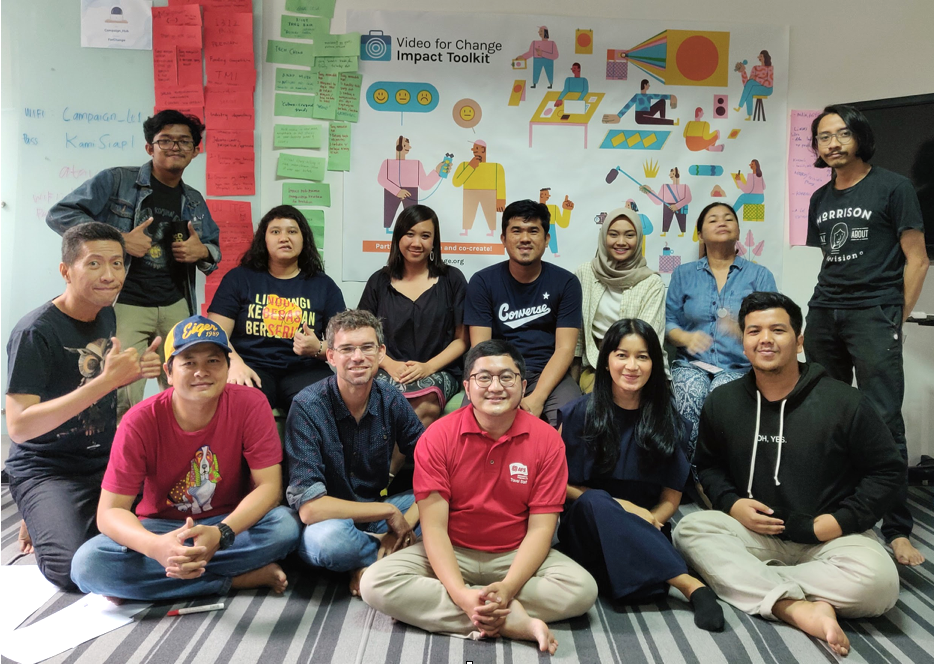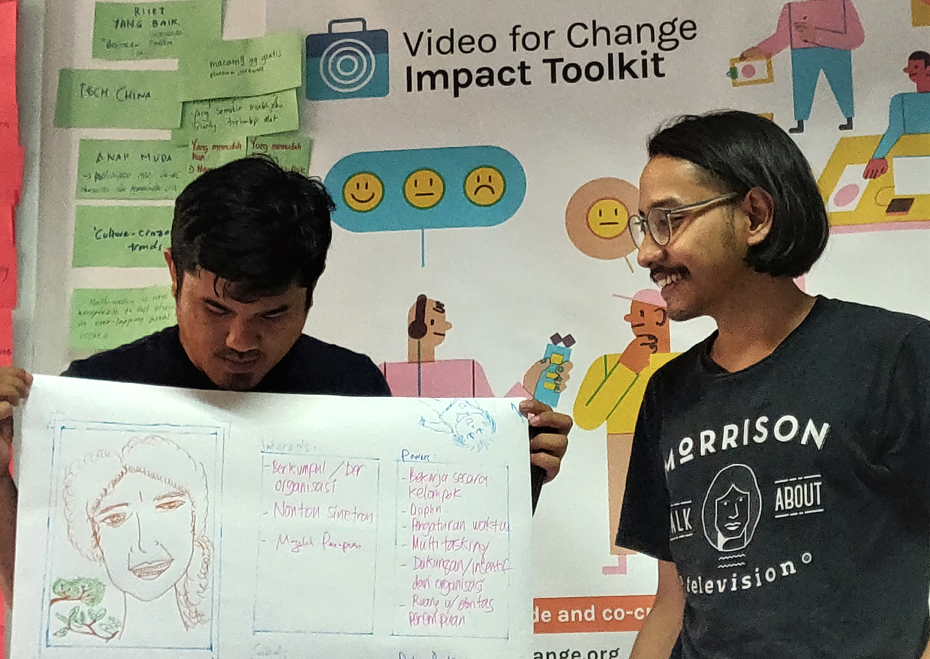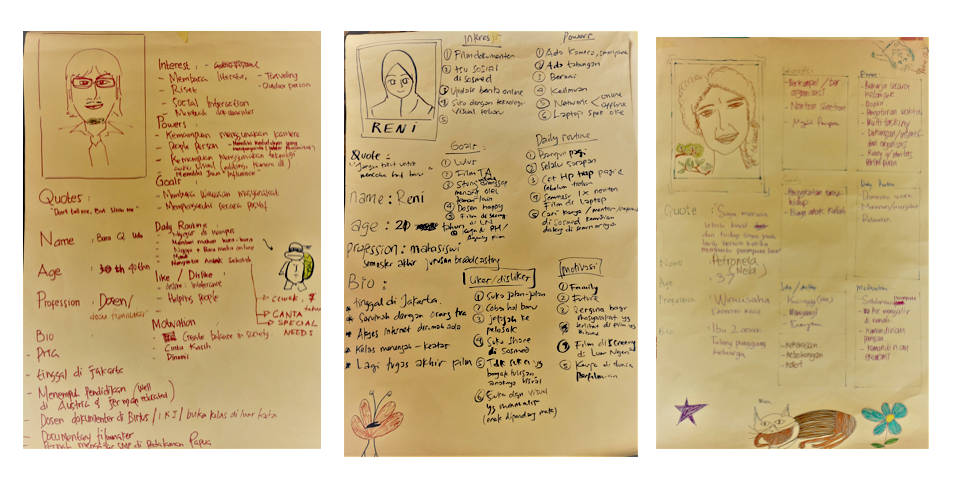
Video for Change Impact Toolkit Co-Creation Lab, held in Jakarta prior to the release of Indonesian Language version of the Impact Toolkit, December 2019.
“The toolkit is a great guide for video-makers to measure and strengthen the impacts their creations bring forth.” ~ Anonymous remark from our post-event survey
EngageMedia, running up to the release of the Bahasa Indonesia version of the Video for Change Impact Toolkit, facilitated a Co-Creation Lab in Jakarta for 14 Indonesian video practitioners. For this event, we collaborated with Campaign, an organization that helps people better organize social campaigns, who participated and provided their workshop space in central Jakarta.
The mix of senior and junior videographers, NGO workers, and impact producers in the room resulted in a wealth of inputs for the Impact Toolkit. Engaging discussions at both a practical (How do I do this?) and theoretical level were sparked during every session of this inspiring two-day event. We discovered that the co-creation lab provided a much-needed space for video practitioners to share, while at the same time allowing us to open up our design process.
So, instead of working from the knowledge, expertise, and data within the Video4Change Network towards designing a useful learning experience for Indonesian-speaking users, we tried to work the other way around. By starting from an actual need, a valuable learning experience for an existing user, and, from there, we worked our way back up to the available knowledge in the Impact Toolkit and the Video4Change Network.
For instance, we asked participants what impacts they’ve experienced or have seen happening at the research and planning stages. Below is a selection of the impacts they mentioned. All of them are real-life indications of social change, which participants felt resulted from their initial engagements with a community at the start of a video initiative.
- Community members better understand the effects social issues have on their lives
- A comprehensive and easy to understand problem formulation is created due to the participation with and information gathered from the community
- Community members learn about other dimensions of knowledge
- Community members identify their own target audiences
- Some community members join the video production team and participate in the research and creation of the video
- Community members are consulted until they understand the issue and become supportive of the goal of the video initiative
At the Co-creation Lab in Jakarta, Egbert Wits asks "What is Impact?" – while sharing about the #Video4change #ImpactToolkit https://t.co/GQkmBsDLWz #LabKokreasi pic.twitter.com/NE5LZv8TGC
— EngageMedia (@EngageMedia) November 11, 2019
Interestingly, according to the video practitioners present, most of the impacts they mentioned actually occur “spontaneously” (they simply happen) without being part of a set strategy or plan. More often than not, they actually spend little time thinking about these impacts. Even though their gut feeling tells them they want to use film and video to contribute to a better society, in practice, they’re often not evaluating, and sometimes even ignoring the signs. Creating social impact is not a full-fledged part of their strategies. Making a great film, getting the video done, somehow always comes first. Not surprisingly, joining this event formed a massive wake-up call for most of those present.
Simply imagine: If you are aware of the potential impacts your video initiative could have at various stages, and you make achieving (some of) these impacts a key part of your strategy, the overall potential for obtaining social impact becomes immeasurably bigger.
“Hopefully, the Impact Toolkit will reach a lot of communities. Everybody has a story to tell, and having this knowledge makes it infinitely more effective, impactful, and much easier.” ~Dina Purita Antonio-Jufri, journalist / visual storyteller
After looking at various pathways for impact at different stages of a video initiative, we also discussed some of the values and methods video for change practitioners should uphold. We learned that, in practice, upholding some of these values, especially those around informed consent, can be quite a challenge.
We ended our two-day event creating several personas. A persona, in our case, is a semi-fictitious Indonesian speaking person who will be using the Impact Toolkit.
Hence, Reni, a 21-year-old student who’s making a video as part of her final university assignment, was created by our younger participants. Reni lives in a big city and is mostly interested in passing her exams, but wants to stand out amongst her classmates with a video that has a strong social theme.
We also met Bara, a 40-year-old film school lecturer who teaches documentary film and has lately become interested in the potential documentary film has to harness positive social change.
And let’s not forget Nela, a diligent and hardworking single mother from Eastern Indonesia. Involved in a local action group, she is struggling to convince the local government to provide better water facilities, as many women in her community currently spend 2-3 hours a day fetching water. She has an idea of using video to collect evidence and create convincing stories to persuade the government into taking action.
Day 2 of the Co-creation Lab with the #Video4change #ImpactToolkit in Jakarta, Indonesia. Egbert Wits (@ekbret) discusses how to strategise for impact throughout any video initiative. https://t.co/QH0pKFY8PY #LabKokreasi pic.twitter.com/rhJ7EQOyl9
— EngageMedia (@EngageMedia) November 12, 2019
We simply ran out of time to discuss all the different ways in which the Bahasa Indonesia version of the Impact Toolkit could be useful for these personas. Fortunately, we did manage to design a few user journeys, which, together with all the other inputs, we have shared with our editorial team.
The general conclusion at the end of the second day was that more people need to know about the Impact Toolkit. For safety reasons and also because few video practitioners and filmmakers in Indonesia know about the many potential roles video can play as a tool for social change. As one participant put it:
“Social impact should be the starting goal for making a video. Video practitioners need to learn how a video can contribute to change, decide on what kinds of impacts they want to achieve and how to measure these.”
We hope to launch the Indonesian Impact Toolkit on November 29, 2019. Some of the amazing participants of the co-creation lab will be in it, as they share their stories and experiences of using video as a social change tool.
Are you interested in what happens during and after the release of the Bahasa Indonesia Impact Toolkit? Simply drop us a line. We will add you to our mailing list and make you part of our journey.


